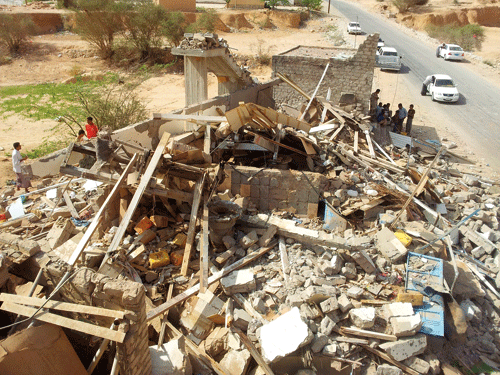Yemen is not just a land of many problems — its sky has problems too. The receding annual rainfall from the clouds above has made way for another precipitant: missiles from remote-controlled American aircraft. The United States has been flying armed drones over Yemen since 2002, targeting Al Qaeda in the Arabian Peninsula (AQAP) and recently these strikes have increased dramatically. The Obama administration has authorized more airstrikes and drone attacks in the past two years than Bush did during his eight years in office. Far too often civilians are paying the price. In 2012 alone, US missiles killed at least 185 Yemenis in as many as 90 strikes.
Among the tactical changes of the Obama administration has been its “signature drones” policy, by which drone operators can engage targets based solely on “suspicious behavior” observed through telescopic cameras far above, rather than on hard intelligence gathered on the ground. In a country where, in remote areas, people carry guns like people in the West carry iPhones, this policy makes almost everyone a “legitimate target”. Consequently, the tragedies have increased.
US drones have killed hundreds of Yemeni men, women and children with no connection to AQAP, aid workers and even prominent leaders working at the behest of the US government in rural Yemen. American embassy cables released by Wikileaks revealed how former President Ali Abdullah Saleh had secretly offered the US political cover for the drone program, telling former Central Command General David Petraeus, “We’ll continue saying the bombs are ours, not yours.”
His successor, the current president, Abdu Rabu Mansour Hadi, has been far less discrete, publicly endorsing drone operations in late September on a visit to Washington praising their accuracy and technological advancement. Former opposition leaders, who once lambasted Saleh for allowing US drones to violate Yemen’s sovereign skies, have remained silent. Facing growing public outrage over the drone strikes, these leaders, especially from the Islah Muslim brotherhood in Yemen, are also pressuring their supporters to remain quiet as well.
President Hadi’s support for the drones has made him a darling of the US — the American ambassador said in a press conference that the US’ relationship with Hadi was even stronger than it was with Saleh and that America would be happy if he ran in the presidential elections again in 2014 — but to the average Yemeni, it makes their first freely elected president in decades look like an American puppet. Remember, a main catalyst for the uprising that overthrew Saleh was that he was accountable to Washington rather than his own people. Local opponents to Hadi are thus amassing a political, legal and moral war chest against the president.
Importantly, neither the Yemeni nor the American government has paid any type of compensation to the innocent victims of drone strikes, while AQAP has an extensive record of compensating the families of civilians inadvertently harmed during its operations. Indeed, AQAP has become an outlet for Yemenis bent on revenge after losing relatives to American missiles, making the drone program a crucial tool of AQAP’s recent recruitment drive, contrary to the loud denials of American security experts. It must be said that these “experts” rarely have a clue what is happening in Yemen given that they almost never travel beyond the perimeter of their five-star hotels in the capital, Sanaa. Were they to, they would see how many Yemenis recoil at even the words “American military” and how strong a patriarchal position Al Qaeda has built out of the drone program. It has learned that its war with America is a war of mistakes — the fewer you make, the more you win and drones are simply far more prone to mistakes than AQAP.
In America, drones are a fascinating technology in a videogame war where US soldiers neither put themselves at risk nor feel the blood on their hands of those they kill. This has made American policy makers arrogant and overbearing when it comes to even discussing drones, an attitude that history will not treat kindly. Like the McNamara policy in Vietnam of counting enemy corpses as a metric of success, the US drone policy in Yemen will embody America’s moral erosion in our times.








